This dissertation was written to investigate the significance, impact and future development of the trophy hunting industry in Namibia, one of the least populated countries in the world. Secondary research identified trophy hunting, a micro-tourism niche, as a highly controlled consumptive form of wildlife utilisation, successfully applied for species protection and conservation of game in Namibia. The economic income of the industry has increased over the years partly due to the establishment of conservancies. Moreover a questionnaire with quantitative quality questions was developed and sent out to individual experts (hunting guides, farmers and game farmers) operating in the trophy hunting industry in Namibia. Findings of the primary research were grouped, compared and contrasted with the findings of the secondary research and represented as percentages, graphs, cross tabulations and the Likert scale. Results showed that trophy hunting contributes towards education, job creation, species protection and conservation of the natural habitat. It was also identified that trespassing, illegal activities, foreign hunting guides and lack of human recourses pose a threat to the industry. The trophy hunting industry of Namibia in the opinion of individual experts and the minister of environment and tourism of Namibia has great potential for a sustainable future development.
Inhaltsverzeichnis (Table of Contents)
- Chapter 1: INTRODUCTION
- INTRODUCTION
- BACKGROUND
- AIM
- OBJECTIVES
- STRUCTURE OF DISSERTATION
- Chapter 2: LITERATURE REVIEW
- INTRODUCTION
- SUSTAINABLE DEVELOPMENT
- Sustainability in Tourism
- WILDLIFE TOURISM
- Trophy Hunting
- Trophy Hunting in Namibia
- Conservancies in Namibia
- Conservancies Association of Namibia
- RELEVANCE OF TROPHY HUNTING IN NAMIBIAN TOURISM
- Trophy Hunting and Social Aspects
- Economic Arguments of Trophy Hunting
- Trophy Hunting and the Environment
- ORGANISATION FOR TROPHY HUNTING IN NAMIBIA
- Namibian Professional Hunting Association
- Classifications for Trophy Hunting Guides
- Hunting Permits and Regulations
- CHAPTER SUMMARY
- Chapter 3: METHODOLOGY
- INTRODUCTION
- SECONDARY RESEARCH
- Books
- Statistical Reports, Magazines and Governmental Publications
- Online Resources
- PRIMARY RESEARCH
- Data collection tool development
- Questionnaire Design
- Sampling
- Ethics
- Analysing Methods
- Chapter 4: RESULTS AND ANALYSIS
- INTRODUCTION
- PARTICIPANT PROFILES
- FINDINGS
- Trophy Hunting as Conservation Tool
- Forms of Trophy Hunting
- Trophy Hunting and Species Protection
- Trophy Hunting and Tourism
- Trophy Hunting and other Organizations
- Trophy Hunting and Conservancies
- Trophy Hunting Industry in Namibia
Zielsetzung und Themenschwerpunkte (Objectives and Key Themes)
Diese Dissertation befasst sich mit der Bedeutung, den Auswirkungen und der zukünftigen Entwicklung der Trophäenjagdindustrie in Namibia, einem der am dünnsten besiedelten Länder der Welt. Das Ziel ist es, die Rolle der Trophäenjagd im namibischen Tourismus und deren Bedeutung für die nachhaltige Entwicklung zu untersuchen.
- Trophäenjagd als Mikro-Tourismus-Nische
- Die Auswirkungen der Trophäenjagd auf die Tierwelt und die Ökologie
- Die sozioökonomischen Vorteile der Trophäenjagd für die lokale Bevölkerung
- Die Rolle von Naturschutzgebieten für die nachhaltige Trophäenjagd
- Die Herausforderungen und Chancen der Trophäenjagdindustrie in Namibia
Zusammenfassung der Kapitel (Chapter Summaries)
Das erste Kapitel führt in das Thema ein und beleuchtet den Hintergrund, die Zielsetzung und die Struktur der Dissertation. Kapitel 2 bietet eine umfassende Literaturübersicht, die verschiedene Konzepte wie nachhaltige Entwicklung, Wildtier-Tourismus und Trophäenjagd beleuchtet. Darüber hinaus werden die Rolle von Naturschutzgebieten und die sozioökonomischen Auswirkungen der Trophäenjagd in Namibia untersucht. Kapitel 3 beschreibt die Methodik der Dissertation, einschließlich der verwendeten Sekundär- und Primärforschung sowie die Entwicklung und Durchführung eines Fragebogens. Kapitel 4 präsentiert die Ergebnisse und Analysen der Forschung, wobei der Schwerpunkt auf den verschiedenen Aspekten der Trophäenjagd und deren Bedeutung für die Naturschutz- und Tourismusbranche in Namibia liegt.
Schlüsselwörter (Keywords)
Die wichtigsten Schlüsselwörter und Schwerpunktthemen dieser Dissertation sind Trophäenjagd, Namibia, Tourismus, nachhaltige Entwicklung, Naturschutz, Wildtiermanagement, Ökologie, sozioökonomische Auswirkungen, Naturschutzgebiete, Konservierungsverbände und die Rolle von Experten in der Trophäenjagdindustrie.
Häufig gestellte Fragen
Welche Bedeutung hat die Trophäenjagd für Namibia?
Sie gilt als Mikro-Tourismus-Nische, die wesentlich zum Artenschutz und zur wirtschaftlichen Entwicklung des ländlichen Raums beiträgt.
Dient Trophäenjagd wirklich dem Naturschutz?
Ja, durch kontrollierte Jagd werden Anreize geschaffen, natürliche Lebensräume zu erhalten und Wilderei zu bekämpfen.
Was sind „Conservancies“ in Namibia?
Gemeindebasierte Naturschutzgebiete, in denen die lokale Bevölkerung die Rechte zur Nutzung der Tierwelt besitzt und von den Einnahmen profitiert.
Welche Risiken bedrohen die Jagdindustrie in Namibia?
Illegale Aktivitäten, Landstreitigkeiten und ein Mangel an qualifizierten Fachkräften werden als Bedrohungen genannt.
Wer reguliert die Jagd in Namibia?
Das Ministerium für Umwelt und Tourismus sowie Verbände wie die Namibian Professional Hunting Association legen strenge Regeln fest.
- Arbeit zitieren
- Bernd Grahl (Autor:in), 2009, Perspectives on trophy hunting in tourism; Namibia as a case study, München, GRIN Verlag, https://www.grin.com/document/175328



